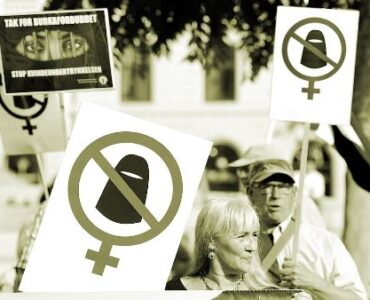
Islamic Law
Many Muslim leaders in the West would like to see Western states recognize Islamic law as a body of public law, which would provide parallel legal status for Muslims with those of other religions. In a few instances Muslims in the West have been able to negotiate some accommodation of their particular traditional, cultural, and religious needs regarding burial practices. Among the early immigrants, the fear of being buried among the “unbelievers” led to repatriating corpses to the country of origin. The acquisition of cemeteries dedicated to Islamic burials in the West have all but put an end to this practice in the United States, Canada, and many parts of western Europe, although some families repatriate the dead for emotional reasons. Furthermore, despite laws to the contrary, in some instances Muslims have been able to prepare the corpse for burial in accord with Islamic tradition and have been allowed to use shrouds in place of coffins. A few mosques in western Europe and North America have even built rooms on the premises for the ritual washing of the dead. In other places exceptions have been made in violation of zoning laws. For example, some mosques in Britain that do not meet the specifications of religious areas, such as adequate parking space, have been legalized to accommodate the needs of the population.
Eating meat that has been slaughtered according to correct ritual practice has become increasingly important for many Muslims in the West as a means to distinguish themselves from Westerners and maintain their cultural identity. A shop in Manningham, England, advertises that it uses ritually slaughtered (halal) meat for the kebab it sells along with fish and chips.
During the 1984 general election in Britain, Muslims demanded recognition of the shari’a in matters of personal status law: marriage, divorce, child custody, and inheritance. Although law in Britain covers all citizens regardless of their religious affiliation, some consideration to Muslim legal traditions appears to have been made in at least two divorce cases in which the husband had to pay the specified amount in the marriage contract rather than to follow British custom. In several cases, in both the United States and Canada, the family courts have recognized the Islamic marriage contract as a legal document, equivalent to a prenuptial agreement, whose stipulation for settlement in the case of divorce is approved by the courts.
Eating halal food (meat from animals that have been properly slaughtered and contains no pork by-products) has assumed a vital symbolic dimension. Although early immigrants followed the fatwa by the Islamic modernist Muhammad Abduh sanctioning the eating of meat killed for Christians and Jews, mosques are increasingly disseminating information and raising consciousness, declaring that eating such food is un-Islamic. The immigration of Muslims from the subcontinent since the late 1960s and the growth of the Islamist ideology among immigrants have put a great deal of emphasis on dietary laws to keep Muslims from mixing socially with non-Muslims. In the United States, African American Muslims have a tradition of using dietary laws as boundaries around the community. In Bradford, England, two Muslim butchers were fined 3,500 pounds in 1986 for operating outside the parameters governing the slaughter of animals. This brought a strong reaction from the Muslim community, but when the Bradford Council for Voluntary Services allocated special funds to take care of the dietary concerns of Muslims, other people in the community objected. The council proposed that meat sandwiches would be served on separate platters and food containing alcohol would not be served to Muslims. An ethnic menu and halal meat will, whenever possible, be provided by the catering services hired by the council. They also proposed in-service training in ethnic cooking for all council cooks.
While issues of diet and proper space for worship and burial are being negotiated and resolved by government institutions, the growing public debate concerns the consequences of the Muslim presence for liberal societies in the West. The focus is most recently on the role of women in Islam, who in Western perception are considered to be oppressed. Such views have been reinforced by televised reports about the treatment of women in revolutionary Iran and in Afghanistan under the rule of the Taliban and by the vocal rejection of the universal values for womanhood as promoted by the United Nations. The issues range from abortion, female genital mutilation, and sexual orientation to wearing the veil.
The issue of wearing the hijab (headscarf) took on national significance in France when several female students were banned from wearing them on the grounds that such dress is tantamount to proselytizing, a proscribed activity in the secular schools of France. The debate that followed in the French press dwelled on related issues. Is the hijab a cover for the persecution and repression of women? Is it the Muslim standard raised to challenge the French Tricolor? Is it a means of snubbing a hospitable French society by an ingrate population flaunting its reactionary customs in the midst of the center of Western civilization? For Muslims the ban was seen as an anti-Muslim act because Christians are allowed to wear crucifixes and Jews yarmulkes, both of which should similarly, under the circumstances, be interpreted as acts of propagating a faith. The issue of the hijab has surfaced under different rubrics in other Western nations. For example, in Canada feminists championed the banning of headscarfs, which they depicted as a symbol of oppression. Young Muslim women who donned the scarf insisted that it was an act of obedience to a divine injunction and was therefore protected under freedom of religion. Some Muslim women viewed wearing the hijab as an instrument of liberation from being a sex object. In the United States the Council on American-Islamic Relations reported that there was a 50 percent increase in 1996 in the number of incidents of discrimination against women who wear the hijab.
Islamic Law
803 – 042
http://discerningislam.com
Last Updated: 04/2022
See COPYRIGHT information below.



